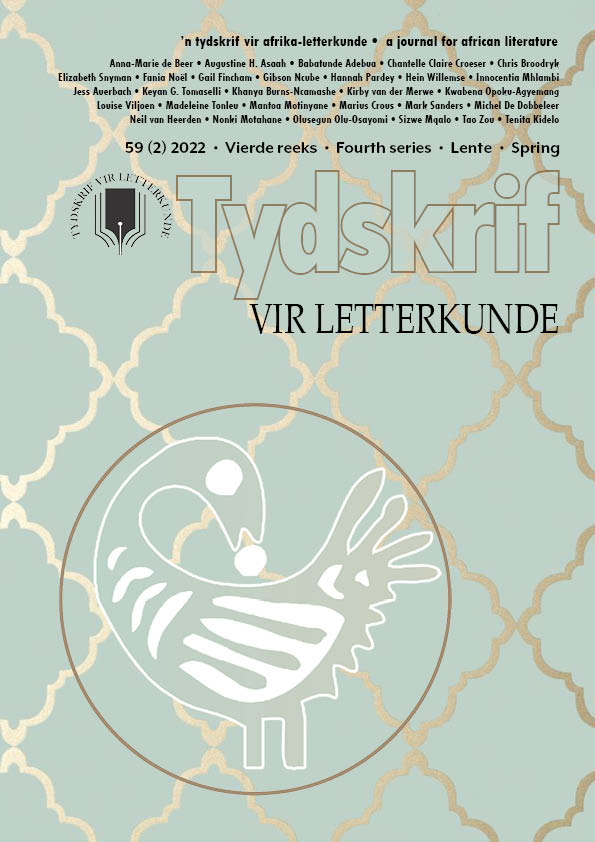Towards reconstructing Africa: Recuperation and responsibility in Ayi Kwei Armah’s The Healers
DOI:
https://doi.org/10.17159/tl.v59i2.13220Keywords:
Ayi Kwei Armah, The Healers, African recuperation, African responsibility, African reconstructionAbstract
A product of Africa’s pre-colonial and colonial history, Ayi Kwei Armah’s fifth novel, The Healers (1978), is steeped in an African communalistic worldview and the functional conception of art. In this article we examine the multiple dimensions to recuperation within the context of the reconstruction of Africa, the continental search for utopia, and the responsibility that this places on Africans. Using Armah’s communitarian perspectives on health as a guide, we identify six interlocking subsets of recuperation as healing, re-creation, renascence, repossession, recall, and Sankofa (return). Informed by Molefi Kete Asante’s construct of agency and Armah’s communalistic injunctions to readers, we establish that permeating each of these building blocks is the responsibility of Africans to operationalize the reconstruction of Africa, the leitmotif of the novel. As helpers, visionaries, and custodians of vital traditional knowledge and skills, the healers facilitate the sharing of information on Africa’s past and future against the background of British colonial domination. We also show that Armah deliberately gives the novel this polysemic title to transcend the spatial, cultural, and epistemic limitations imposed on the continent by the colonial order. We conclude that the social orientation and creative configuration of health in the work are consistent with the diverse and intermingling meanings of recuperation.Downloads
References
Adu-Gyamfi, Samuel & Eugenia Ama Anderson. “Indigenous Medicine and Traditional Healing in Africa: A Systematic Synthesis of the Literature.” Annals of Philosophy, Social and Human Disciplines no. 1, 2019, pp. 69–100. DOI: http://dx.doi.org/10.17613/wqp1-1q34.
Armah, Ayi Kwei. The Beautyful Ones are not yet Born. Heinemann, 1969.
Armah, Ayi Kwei. The Eloquence of the Scribes: A Memoir on the Sources and Resources of African Literature. Per Ankh, 2006.
Armah, Ayi Kwei. The Healers. Per Ankh, 2000.
Armah, Ayi Kwei KMT: In the House of Life. Per Ankh, 2002.
Armah, Ayi Kwei. “Masks and Marx: The Marxist Ethos vis-à-vis African Revolutionary Theory and Praxis.” Présence Africaine no. 131, 1984, pp. 35–65.
Armah, Ayi Kwei. Osiris Rising: A Novel of Africa Past, Present and Future. Per Ankh, 1995.
Armah, Ayi Kwei. Remembering the Dismembered Continent. Per Ankh, 2010.
Armah, Ayi Kwei. The Resolutionaries. Per Ankh, 2013.
Armah, Ayi Kwei. Two Thousand Seasons. East African Publishing House, 1973.
Asante, Molefi Kete. “Afrocentricity: Notes on a Disciplinary Position.” Handbook of Black Studies, edited by Molefi Kete Asante & Maulana Karenga. Sage, 2006, pp. 152–63.
Ashcroft, Bill. “Remembering the future: utopianism in African Literature.” Textual Practice vol. 23, no. 5, 2009, pp. 703–22. DOI: https://doi.org/10.1080/09502360903169102.
Boafo, Y. S. “The Nature of Healing in Ayi Kwei Armah’s The Healers.” Critical Perspectives on Ayi Kwei Armah, edited by Derek Wright. Three Continents, 1992, pp. 324–34.
Cabral, Amilcar. Return to the Source: Selected Speeches of Amilcar Cabral, edited by Africa Information Service. Monthly Review, 1973.
Comaroff, Jean. “The Diseased Heart of Africa: Medicine, Colonialism, and the Black Body.” Knowledge, Power, and Practice, edited by Shirley Lindenbaum & Margaret Lock. U of California P, 1993, pp. 305–29.
Fanon, Frantz. The Wretched of the Earth, translated by Richard Philcox. Grove, 2004.
Gikandi, Simon. “History and Character in The Healers.” Critical Perspectives on Ayi Kwei Armah, edited by Derek Wright. Three Continents, 1992, pp. 315–23.
Jackson, Sally-Anne. “Disease and Biomedicine: Colonial Strategies in Southern Africa.” Diss. U California-Riverside, 2003.
Konadu, Kwasi. “Medicine and Anthropology in Twentieth Century Africa: Akan Medicine and Encounters with (Medical) Anthropology.” African Studies Quarterly vol. 10, no 2 & 3, 2008, pp. 45–69.
Konadu, Kwasi. Indigenous Medicine and Knowledge in African Society. Routledge, 2007.
Kong, Camilia. “African Personhood, Humanism, and Critical Sankofaism: The Case of Male Suicide in Ghana.” International Perspectives in Values-Based Mental Health Practice: Case Studies and Commentaries, edited by Drozdstoy Stoyanov et al. Springer, 2021, pp. 85–93. DOI: https://doi.org/10.1007/978-3-030-47852-0_10.
Kourouma, Ahmadou. Les soleils des indépendances. P U de Montréal, 1968.
Lindfors, Bernth. “Armah’s Histories.” Critical Perspectives on Ayi Kwei Armah, edited by Derek Wright. Three Continents, 1992, pp. 267–77.
Lund, Giuliana. “‘Healing the Nation’: Medicolonial Discourse and the State of Emergency from Apartheid to Truth and Reconciliation.” Cultural Critique no. 54, 2003, pp. 88–119. DOI: https://doi.org/10.1353/cul.2003.0036.
Mtshali, Khondlo. “Psychopathology and Healing in Ayi Kwei Armah’s Two Thousand Seasons and The Healers.” Postcolonial Text vol. 5, no. 2, 2009, pp. 1–15.
Nwahunanya, Chinyere. “The Writer as Physician: The Therapeutic Vision in Ayi Kwei Armah’s The Healers.” Neohelicon vol. 22, 1995, pp. 141–54. DOI: https://doi.org/10.1007/bf02129759.
Ogede, Ode S. “The Rhetoric of Revolution in Armah’s The Healers: Form as Experience.” African Studies Review vol. 36, no. 1, 1993, pp. 43–58. DOI: https://doi.org/10.2307/525507.
Ouologuem, Yambo. Le devoir de violence. Seuil, 1968.
Owusu, Philip. “Adinkra Symbols as ‘Multivocal’ Pedagogical/Socialization Tool.” Contemporary Journal of African Studies vol. 6, no. 1, 2019, pp. 46–58. DOI: https://doi.org/10.4314/contjas.v6i1.3.
Petrie, Peter R. “The Politics of Inspiration in Ayi Kwei Armah’s The Healers.” Critique: Studies in Contemporary Fiction vol. 38, no. 4, 1997, pp. 279–88. DOI: https://doi.org/10.1080/00111619.1997.10543181.
Quarcoo, Alfred Kofi. The Language of Adinkra Symbols. Sebewie, 1994.
Said, Edward W. Culture and Imperialism. Vintage, 1994.
Senghor, Léopold Sédar. “‘Nous ne pouvons pas être en pensant par les autres’. Une interview du Président Senghor à ‘Congo-Afrique’.” Interview with Crispin Mulumba, Anastasie Kongolo, Théophile Ayimpam, Oscar Manwana, Juvénal Ngoie & René Beeckmans. Congo-Afrique no. 33, 1969, pp. 107–17.
Sodi, T. et al. “Indigenous Healing Practices in Limpopo Province of South Africa: A Qualitative Study.” International Journal of Health Promotion and Education vol. 49, no. 3, 2011, pp. 101–10. DOI: https://doi.org/10.1080/14635240.2011.10708216.
Yin, Jing. “Negotiating the Center: Towards an Asiacentric Feminist Communication Theory.” Journal of Multicultural Discourses vol. 4, no. 1, 2009, pp. 75–88. DOI: https://doi.org/10.1080/17447140802651660.
Published
Issue
Section
License
Copyright (c) 2022 Tydskrif vir Letterkunde

This work is licensed under a Creative Commons Attribution-ShareAlike 4.0 International License.


 https://orcid.org/0000-0001-6465-6584
https://orcid.org/0000-0001-6465-6584


.png)